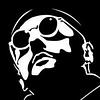Take a photo of a barcode or cover
Peter Carey based My Life as a Fake on a real incident in Australia where a writer perpetrated a hoax by publishing the poems of an individual he claimed was dead, but never really existed. While the actual incident would be interesting enough, Carey takes this further by have the supposedly imagined poet show up in the life of the individual who created the hoax.
The story is told by Sarah - the editor of a London Lit journal who has followed another writer, Slater to Malaysia. Slater, knew Sarah's mother and part of her reason to go there is because she wanted to know what really happened between Slater and her mother. That subplot is a perfect subtle way of getting the reader to question the narrator's reliability. Added to that, a layering of stories told to the narrator that sometimes include another told to them. The reader receives conflicting stories through this technique and one finds oneself wonder which is true.
Sarah, while in Malaysia, she runs into Christopher Chubb, the man who created the poetry hoax. He shows her a poem he insists is the work of Bob McCorkle, the supposedly made up poet. She realizes it is a brilliant piece of writing, but Chubb says he must tell her his story. His story is also told by Slater, giving the reader two different sides. As the story continues, Chubb tells his story, and the story of the hoax, of Bob McCorkle come to life, of his daughter, his lover, and the stories of others who help or hinder him along the way, as well as telling the stories they have told to him. We also hear directly from the daughter through the narrator and Slater tells Sarah versions of some events he participated in, heard, or witnessed that differ to the point that the are sometimes in direct conflict with what we learn before or after. The narrator herself begins to question things, but her own desires color what she chooses to believe. Slater also tells her what really happened to her own mother, even though she remembers it differently.
In the end, the narratives weave in and out, closer and further from the narrator and the reader is left to question what did or didn't happen - and is left to the reality that none of the characters are all that likable. Does a character's likability make it more like we believe their version? Sarah starts as likable, but as the story progresses I found her less and less so. Her obsession reflects that of Chubb and at least one version of McCorkle, and while the end is of course in question, one imagines she end up similarly.
It is rare to find a book where the characters aren't especially likable, yet My Life as a Fake is wonderfully engrossing. Carey does an excellent job at recreating post-war Australia, and 1950's and 70's Malaysia for the readers, and in creating engaging characters that are fully drawn if not particularly sympathetic. I found that even though the story was being told to the narrator, each of the characters in any given story had their own voice. He also has created a sort of literary Frankenstein in Bob McCorkle that keeps the plot moving and building to the shocking end. The story is action packed and full of vivid details — an impressive feat when you realize that during the course of the narration, only a short time passes in opposition to the decades the stories told to her take, and, other than moving from place to place where characters meet and the story is revealed, there is little real-time action.
Carey's characters are epically flawed - they are greedy, selfish, amoral, and vengeful (often for slights perceived as far worse than most of us would see them) and more often than not under the sway of one of those flaws, although they cannot see it, even when reflected in others they accuse of the same. While the end is shocking, it feels inevitable and unavoidable, and the sadness is not for the consequences, but rather for the fact that they couldn't see it coming.
The story is told by Sarah - the editor of a London Lit journal who has followed another writer, Slater to Malaysia. Slater, knew Sarah's mother and part of her reason to go there is because she wanted to know what really happened between Slater and her mother. That subplot is a perfect subtle way of getting the reader to question the narrator's reliability. Added to that, a layering of stories told to the narrator that sometimes include another told to them. The reader receives conflicting stories through this technique and one finds oneself wonder which is true.
Sarah, while in Malaysia, she runs into Christopher Chubb, the man who created the poetry hoax. He shows her a poem he insists is the work of Bob McCorkle, the supposedly made up poet. She realizes it is a brilliant piece of writing, but Chubb says he must tell her his story. His story is also told by Slater, giving the reader two different sides. As the story continues, Chubb tells his story, and the story of the hoax, of Bob McCorkle come to life, of his daughter, his lover, and the stories of others who help or hinder him along the way, as well as telling the stories they have told to him. We also hear directly from the daughter through the narrator and Slater tells Sarah versions of some events he participated in, heard, or witnessed that differ to the point that the are sometimes in direct conflict with what we learn before or after. The narrator herself begins to question things, but her own desires color what she chooses to believe. Slater also tells her what really happened to her own mother, even though she remembers it differently.
In the end, the narratives weave in and out, closer and further from the narrator and the reader is left to question what did or didn't happen - and is left to the reality that none of the characters are all that likable. Does a character's likability make it more like we believe their version? Sarah starts as likable, but as the story progresses I found her less and less so. Her obsession reflects that of Chubb and at least one version of McCorkle, and while the end is of course in question, one imagines she end up similarly.
It is rare to find a book where the characters aren't especially likable, yet My Life as a Fake is wonderfully engrossing. Carey does an excellent job at recreating post-war Australia, and 1950's and 70's Malaysia for the readers, and in creating engaging characters that are fully drawn if not particularly sympathetic. I found that even though the story was being told to the narrator, each of the characters in any given story had their own voice. He also has created a sort of literary Frankenstein in Bob McCorkle that keeps the plot moving and building to the shocking end. The story is action packed and full of vivid details — an impressive feat when you realize that during the course of the narration, only a short time passes in opposition to the decades the stories told to her take, and, other than moving from place to place where characters meet and the story is revealed, there is little real-time action.
Carey's characters are epically flawed - they are greedy, selfish, amoral, and vengeful (often for slights perceived as far worse than most of us would see them) and more often than not under the sway of one of those flaws, although they cannot see it, even when reflected in others they accuse of the same. While the end is shocking, it feels inevitable and unavoidable, and the sadness is not for the consequences, but rather for the fact that they couldn't see it coming.
A strange but intriguing book. Incredibly complex backstories to characters that reveal themselves throughout. At some point through the book I was suddenly completely lost but soon got back on track. Bizarre characters, but thoroughly enjoyed the backdrop of Kuala Lumpur as well as the Frankenstein element and horror that is underlying.
Another text I had to read for university. I couldn't finish this - I made it about halfway when the pastiche and chopped-up nature of the book finally got to me. What I did read of it was intermittently entertaining, but the writing is too precious for my liking. It's a cult book for a select cult audience, which I'm rapt to say, I'm not a member of.
ugh, confusing and, therefore, not at all compelling. there was so much jumping back and forth between narrators, stories and various bastardizations of the english language. I suspect that only readers who are well-versed in poetry, maybe even in australian poetry, would enjoy this. That's a very narrow audience.
The first book I didn't finish in time for bookclub because every time I tried to read it, I'd fall asleep after 3 paragraphs.
I despise the no quotation mark trend, and if you're going to choose to omit them, the book needs to be well structured and present a decent reason for not using them.
In this case, it was the biggest mistake after a first person narrator. I feel like it could've gotten away with this stylistic approach if it weren't in first person.
Allow me to elaborate a bit: [Edit to Add: this got LONG]
Limited first person narrator, Sarah, is recounting a trip in which she goes to Kuala Lumpur with a family friend and poet, Slater, and meets an exiled Australian named Chubb. The majority of the novel is Chubb recounting HIS life story to Sarah, beginning with his invention of a fake persona named McCorkle to play a dirty trick on a editor who had rejected his [Chubb's] poetry to be published. Are you lost yet? Probably.
Well hold on to your butts because it just gets worse.
Chubb's little trick seemed to conjure up some dude out of the shadows who claimed HE was McCorkle and that Chubb had created him. Blah blah blah, weird love triangle between Chubb, Slater, and some photographer/artist lady which produces a daughter. Chubb insists its his and demands that instead of the mother giving her away for strangers to adopt (she does not wish to be at mother), he will adopt the child himself (and wait for the mother to realize the error of her ways and come crawling back). [Editor's Note: fuck you, dude.]
Well, you guessed it. McCorkle comes back into the picture and kidnaps the baby, running to Malaysia with Chubb chasing them.
All of this bullshit backstory is being endured by Sarah (you remember Sarah right? Our first person narrator?) because Chubb had teased her with the greatest poem she'd ever read and she's dying to get her hands on more to publish in the magazine she edits because she feels she's a failure for not having discovered and published the next Milton. In order for her to have the whole book of poetry, he has to tell her his story. Gouge my eyes out with a spoon.
Chubb continues his story of chasing McCorkle across half of Asia and recounts meeting all sorts of fun people including a Scotsman (who I think only TAUGHT in Scotland...I think he's Indian?!). Don't forget to have the Scotsman's backstory too. We'd have for this to be streamlined and UNcomplicated.
The two buddies find McCorkle and Tina (Chubb's daughter) and they kinda team up to poison him and "rescue" Tina from the only father she's ever known. cool. cool cool cool. Great motive, still kidnapping. (©: Brooklyn Nine Nine)
It goes to shit. Chubb is deported to Australia but a letter from a dying McCorkle brings him back to Malaysia. Now his M.O. is to CURE McCorkle so Tina will realize how great he is and love him. Read the room and let it go dude.
McCorkle does finally die, but not before making Chubb promise to take care of Tina and McCorkle's lover. Christ on a crutch, when will this end.
Back in, nope, not present time; because this novel is about Sarah REMEMBERING the whole debacle in Kuala Lumpur. so back in the middle timeline, Sarah has met Tina and Mrs Lim (McCorkle's lover) and is trying to negotiate a deal with them to publish the book of poetry she's managed to get her hands on, but guiltily returned. Everyone leaves with no deal in sight.
Chubb finds Sarah the following day and says she was foolish and he'll get the book for her. She realized he's going to (re)steal it and she runs to the shop where the book is.
Tina and Mrs Lim are there, gashed open and bleeding. Sarah thinks Chubb did this to them and she's appalled. They say no, he didn't do it. It was two strangers. They point to a window. Below the window is Chubb's body. Dismembered.
Sarah, rightly, freaks the fuck out, and goes to the police. The family friend, Slater, explains that the women killed Chubb and mutilated themselves and made up the two men.
Sarah gets no publishing deal, #obvs, and spends the next 13 YEARS obsessed with Chubb & McCorkle. Specifically if they were even two different people.
The novel finally (FUCKING FINALLY) ends with Sarah and Slater back in Kuala Lumpur and seeing Tina and Mrs Lim at the old shop. They close the door in Sarah's face.
Now. Imagine that, in more detail, with NO QUOTATION MARKS. Good luck figuring out who was talking.
Narrator➡️Chubb➡️ McCorkle
Narrator ➡️ Chubb ➡️Scotsman➡️ Scotsman's Backstory ➡️Chubb➡️ assassination attempt
it's nearly impossible. I can make the argument.. it's not exact quotations of what was said to Sarah, but I swear, just the use of a third person narrator takes away all of this confusion. Third person plus quotation marks and you've got a somewhat interesting story.
Which!, incidentally, is based on a scandal in Australia where two publishers created a fake poet and got caught. Or something. I'm so irritated I'm not gonna fact check that, but this was born out of the Medusa's head of a controversy.
I'm giving it 2 stars in the Stacey Wants a 10 Point Rating Scale on Goodreads. It has potential and the second half of the book is rather captivating, but it's just not worth rereading a paragraph 3 times to make sure you know who's taking.
I despise the no quotation mark trend, and if you're going to choose to omit them, the book needs to be well structured and present a decent reason for not using them.
In this case, it was the biggest mistake after a first person narrator. I feel like it could've gotten away with this stylistic approach if it weren't in first person.
Allow me to elaborate a bit: [Edit to Add: this got LONG]
Limited first person narrator, Sarah, is recounting a trip in which she goes to Kuala Lumpur with a family friend and poet, Slater, and meets an exiled Australian named Chubb. The majority of the novel is Chubb recounting HIS life story to Sarah, beginning with his invention of a fake persona named McCorkle to play a dirty trick on a editor who had rejected his [Chubb's] poetry to be published. Are you lost yet? Probably.
Well hold on to your butts because it just gets worse.
Chubb's little trick seemed to conjure up some dude out of the shadows who claimed HE was McCorkle and that Chubb had created him. Blah blah blah, weird love triangle between Chubb, Slater, and some photographer/artist lady which produces a daughter. Chubb insists its his and demands that instead of the mother giving her away for strangers to adopt (she does not wish to be at mother), he will adopt the child himself (and wait for the mother to realize the error of her ways and come crawling back). [Editor's Note: fuck you, dude.]
Well, you guessed it. McCorkle comes back into the picture and kidnaps the baby, running to Malaysia with Chubb chasing them.
All of this bullshit backstory is being endured by Sarah (you remember Sarah right? Our first person narrator?) because Chubb had teased her with the greatest poem she'd ever read and she's dying to get her hands on more to publish in the magazine she edits because she feels she's a failure for not having discovered and published the next Milton. In order for her to have the whole book of poetry, he has to tell her his story. Gouge my eyes out with a spoon.
Chubb continues his story of chasing McCorkle across half of Asia and recounts meeting all sorts of fun people including a Scotsman (who I think only TAUGHT in Scotland...I think he's Indian?!). Don't forget to have the Scotsman's backstory too. We'd have for this to be streamlined and UNcomplicated.
The two buddies find McCorkle and Tina (Chubb's daughter) and they kinda team up to poison him and "rescue" Tina from the only father she's ever known. cool. cool cool cool. Great motive, still kidnapping. (©: Brooklyn Nine Nine)
It goes to shit. Chubb is deported to Australia but a letter from a dying McCorkle brings him back to Malaysia. Now his M.O. is to CURE McCorkle so Tina will realize how great he is and love him. Read the room and let it go dude.
McCorkle does finally die, but not before making Chubb promise to take care of Tina and McCorkle's lover. Christ on a crutch, when will this end.
Back in, nope, not present time; because this novel is about Sarah REMEMBERING the whole debacle in Kuala Lumpur. so back in the middle timeline, Sarah has met Tina and Mrs Lim (McCorkle's lover) and is trying to negotiate a deal with them to publish the book of poetry she's managed to get her hands on, but guiltily returned. Everyone leaves with no deal in sight.
Chubb finds Sarah the following day and says she was foolish and he'll get the book for her. She realized he's going to (re)steal it and she runs to the shop where the book is.
Tina and Mrs Lim are there, gashed open and bleeding. Sarah thinks Chubb did this to them and she's appalled. They say no, he didn't do it. It was two strangers. They point to a window. Below the window is Chubb's body. Dismembered.
Sarah, rightly, freaks the fuck out, and goes to the police. The family friend, Slater, explains that the women killed Chubb and mutilated themselves and made up the two men.
Sarah gets no publishing deal, #obvs, and spends the next 13 YEARS obsessed with Chubb & McCorkle. Specifically if they were even two different people.
The novel finally (FUCKING FINALLY) ends with Sarah and Slater back in Kuala Lumpur and seeing Tina and Mrs Lim at the old shop. They close the door in Sarah's face.
Now. Imagine that, in more detail, with NO QUOTATION MARKS. Good luck figuring out who was talking.
Narrator➡️Chubb➡️ McCorkle
Narrator ➡️ Chubb ➡️Scotsman➡️ Scotsman's Backstory ➡️Chubb➡️ assassination attempt
it's nearly impossible. I can make the argument.. it's not exact quotations of what was said to Sarah, but I swear, just the use of a third person narrator takes away all of this confusion. Third person plus quotation marks and you've got a somewhat interesting story.
Which!, incidentally, is based on a scandal in Australia where two publishers created a fake poet and got caught. Or something. I'm so irritated I'm not gonna fact check that, but this was born out of the Medusa's head of a controversy.
I'm giving it 2 stars in the Stacey Wants a 10 Point Rating Scale on Goodreads. It has potential and the second half of the book is rather captivating, but it's just not worth rereading a paragraph 3 times to make sure you know who's taking.
Firstly, the no quotation mark dialogue was a bit annoying and unnecessary, but forgiveable.
I've enjoyed all the other Peter Carey books I've read but this one was not for me. The ending in particular was too much of a non-ending. I thought he was leading us one way but then the plot seemed to just fizzle out. It wasn't true enough to the Frankenstein theme and left too many open ends. I get that you want to leave the ending open for interpretation, but surely you can tie a few of the loose bits up.
I've enjoyed all the other Peter Carey books I've read but this one was not for me. The ending in particular was too much of a non-ending. I thought he was leading us one way but then the plot seemed to just fizzle out. It wasn't true enough to the Frankenstein theme and left too many open ends. I get that you want to leave the ending open for interpretation, but surely you can tie a few of the loose bits up.
Another fantastic Carey novel. Not *quite* as spectacular as Oscar & Lucinda, but still a stunner. Highly recommended. I read it in its entirety on the plane back from Australia.
adventurous
dark
mysterious
tense
fast-paced
Strong character development:
Yes
Loveable characters:
Complicated
Diverse cast of characters:
Yes
Flaws of characters a main focus:
Complicated
adventurous
funny
mysterious
reflective
medium-paced
Strong character development:
Yes
Loveable characters:
Complicated
Diverse cast of characters:
No
Flaws of characters a main focus:
Yes
This book was a completely original reading experience for me. It gave me a different feeling from most other books I've read, the characters were unique, and the story line was unpredictable. So it's strange to realize that I won't think of it again. When I changed this book from my "to-read" shelf to "read", I had to read more than one review of it to remember which book it was.
My summary is: interesting, not memorable.
My summary is: interesting, not memorable.








